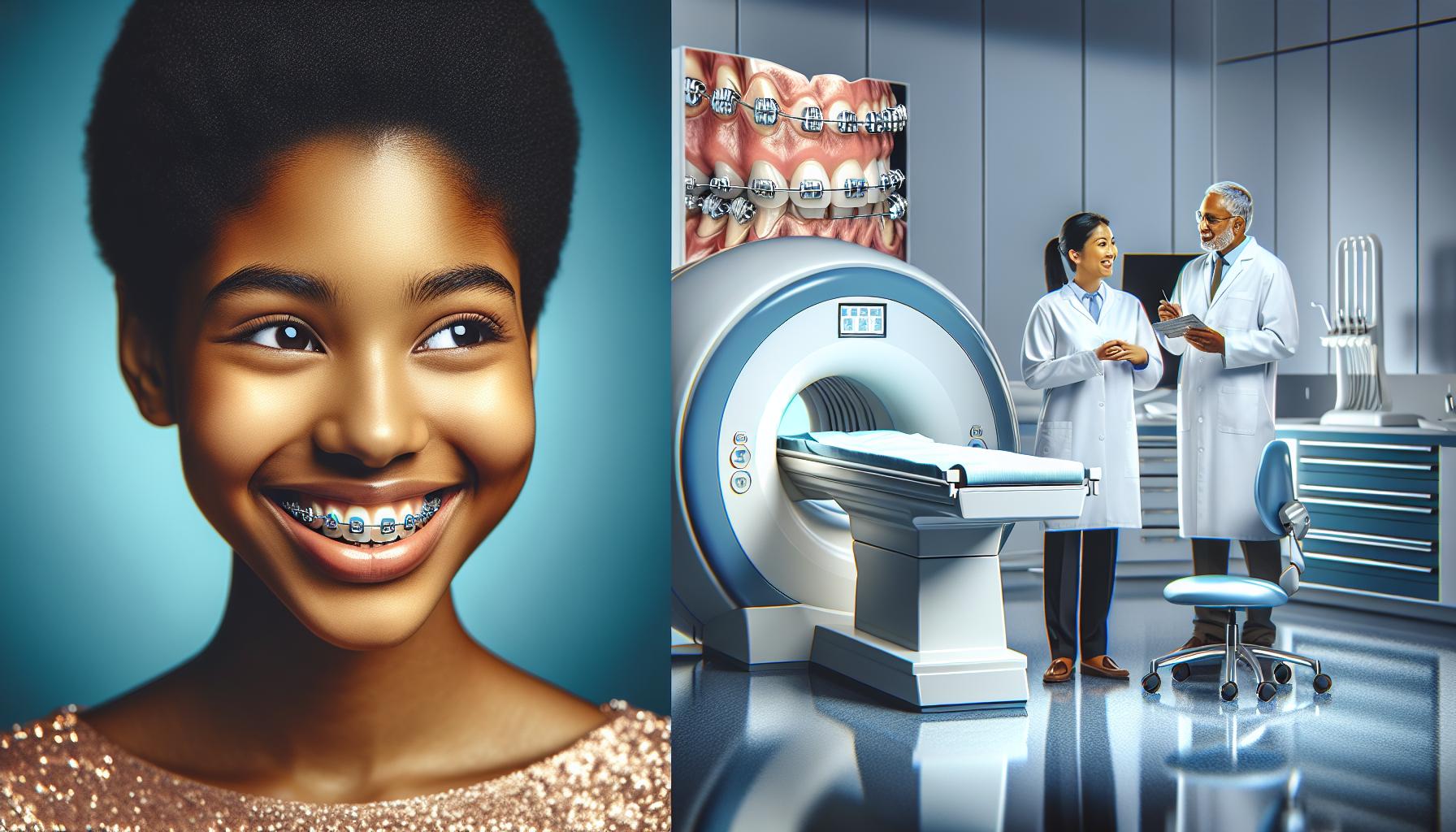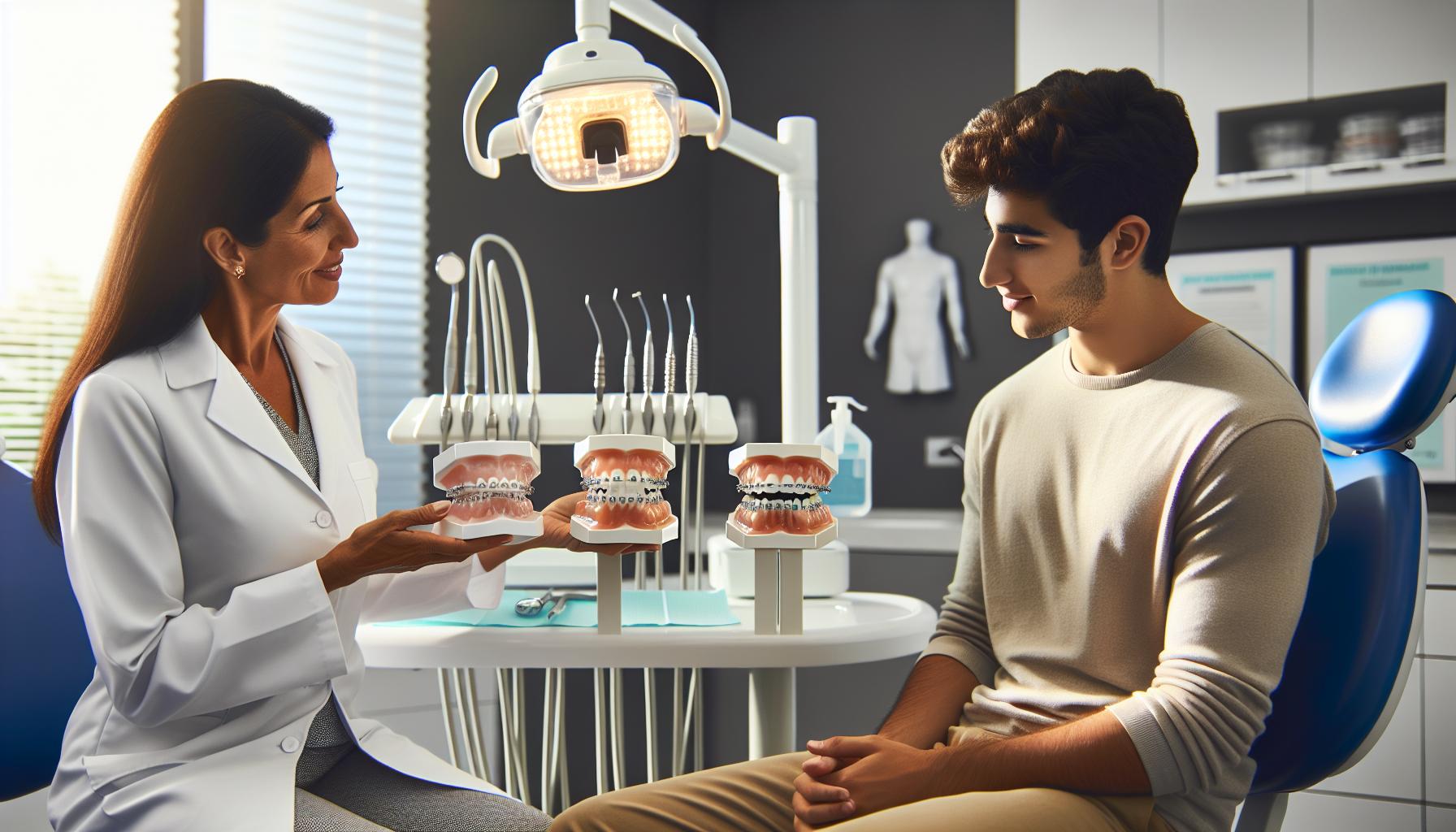If you’re one of the millions wearing dental braces, you might wonder how they affect your ability to undergo an MRI. While MRI scans are essential for diagnosing various medical conditions, some may worry that having braces could pose a risk during the procedure. Understanding the interplay between dental braces and MRI safety is crucial for making informed choices about your healthcare.
Curiosity about what happens if you need an MRI while undergoing orthodontic treatment is completely normal. You might be concerned about potential discomfort, or you’re simply seeking clarification on any misconceptions. Rest assured, we’re here to provide clear answers and practical advice to help ease your worries and ensure that you feel confident and informed about your upcoming medical imaging appointments. Keep reading to discover important safety facts and what you need to consider before your MRI.
Can You Get an MRI with Dental Braces? Understanding the Risks
Undergoing an MRI exam can be a source of anxiety for many, especially if you have dental braces. It’s essential to understand that while dental braces typically contain metal, most current braces are made from materials that are generally safe in an MRI environment. The magnetic fields generated during an MRI can interact with metallic objects, so knowing the specific type of braces you have will help alleviate fears regarding safety.
Braces can sometimes cause artifacts in MRI images, which may obscure the view of surrounding tissues and organs. Although this can complicate the interpretation of the results, it rarely poses a significant health risk. The primary concern is that the metal in braces could potentially heat up in the magnetic field. However, contemporary orthodontic materials are designed to be MRI-compatible.
Before your MRI appointment, it’s important to inform your healthcare provider about your dental braces. This enables them to take the necessary precautions. The MRI technologist may also verify the specific materials used in your braces to assess compatibility better. In most cases, they will proceed confidently, as many patients with braces successfully undergo MRIs without complications.
Overall, understanding the risks associated with dental braces during an MRI provides reassurance. With proper communication between your healthcare providers and attention to detail, you can navigate the process smoothly and focus on the imaging you need for your health assessment.
How Do Dental Braces Affect MRI Imaging?

Dental braces can raise understandable concerns when it’s time for an MRI scan-after all, patients often worry about the potential implications of having metal in their mouths during such a procedure. However, understanding how braces interact with MRI technology can alleviate those fears, ensuring a smoother experience.
The primary effect of dental braces on MRI imaging is the potential for metal artifacts. These artifacts appear as distortions or shadows on MRI images, and while they can obscure the view of nearby tissues, they typically do not impact the safety of the procedure. Most contemporary braces are constructed from materials specifically designed to minimize these interference effects, making them largely compatible with MRI scans. Nonetheless, the images may require careful interpretation by radiologists to compensate for any artifacts caused by braces.
It’s crucial for patients to communicate with both their orthodontist and the MRI technologist about the specifics of their braces. This ensures that the imaging team can prepare accordingly, possibly adjusting the scan parameters to improve image quality and accuracy. If you have any specific concerns or are unsure about the materials used in your braces, discussing these details before the appointment can provide peace of mind and allow for proper planning.
Ultimately, while metal braces may influence the imaging process slightly, they do not typically prevent patients from undergoing MRI scans safely. With effective communication and the cooperation of all involved healthcare providers, patients can navigate their MRI experience without significant worry, focusing instead on the valuable insights these scans provide for their overall health.
Are There Any Safety Concerns with Metals in Braces?

When it comes to undergoing an MRI, concerns about metal dental braces can understandably cause anxiety. However, it’s important to clarify that while metals in braces can create some imaging challenges, they do not pose significant safety risks during the procedure. The materials commonly used in dental braces-such as stainless steel, titanium, and certain plastics-are generally considered compatible with MRI technology. These materials are designed to withstand magnetic fields without compromising patient safety.
That said, patients with braces may experience issues related to metal artifacts on MRI images. These artifacts can appear as distortions or shadows, potentially obscuring the view of adjacent tissues. Radiologists are trained to recognize and interpret these artifacts, often employing specialized techniques to enhance image clarity. This means that while the presence of braces may complicate the interpretation of the images, it does not preclude the diagnostic value of the MRI. Patients are encouraged to inform both their orthodontist and MRI technologist about the specifics of their braces to help adjust imaging parameters as needed.
It’s also essential to understand that most facilities are well-equipped to handle patients with dental braces. Technologists routinely work with various dental devices and are familiar with how to manage them during MRI scans. For those still concerned about safety, consulting with a healthcare professional beforehand can provide additional reassurance tailored to individual situations. By discussing any potential concerns, patients can feel more confident about how their braces may interact with the MRI process.
Ultimately, while patients with braces may need to navigate some complexities related to MRI imaging, adherence to safety protocols and clear communication with healthcare providers will help ensure a smooth and worry-free experience. Relax and focus on the valuable insights an MRI can provide regarding your health, knowing that you are supported throughout the process.
What Alternatives Exist for Patients with Braces?

Patients with dental braces may sometimes feel apprehensive about undergoing an MRI, but there are various alternatives and considerations that can help ensure safe and effective imaging without compromising comfort. If braces pose potential challenges in obtaining clear images, speaking with your healthcare provider about other imaging options may provide viable solutions.
One alternative is using different imaging techniques such as CT scans or ultrasounds, which can be more forgiving in terms of interference from dental braces. These modalities can offer detailed images and may be more suitable depending on the area of concern and the overall diagnostic question at hand. For instance, if the MRI is intended to assess issues related to soft tissues, a CT scan may serve as a practical substitute without the MRI’s metal artifact concerns.
In some cases, temporary removal or adjustment of orthodontic appliances prior to the MRI may be possible. Discussing this option with both your orthodontist and the imaging facility could lead to a customized approach where minor adjustments can facilitate clearer images without significantly affecting your orthodontic treatment. It’s essential to consult your orthodontist to see if this is feasible and to understand the impact on your braces’ adjustment schedule.
Additionally, consider seeking a specialized MRI facility that utilizes advanced imaging techniques specifically designed to mitigate the effects of metal artifacts. Some state-of-the-art MRI machines are equipped to handle dental braces, which can considerably reduce distortion in the images generated. Facilities that offer this technology might be more familiar with coordinating imaging for patients with orthodontic appliances, providing an added layer of reassurance.
Ultimately, proactive communication with your healthcare team is vital. They can facilitate a better understanding of your unique situation while exploring personalized imaging possibilities that will help you receive the care you need with confidence and ease. Remember, your comfort and safety are paramount, and alternatives do exist to accommodate your imaging needs effectively.
Preparing for Your MRI Appointment with Braces
When preparing for an MRI appointment with dental braces, it is essential to address any concerns to make the experience as smooth and stress-free as possible. Understanding the process and taking specific steps can help ensure that the MRI is performed accurately and safely, effectively addressing both your medical needs and personal comfort.
Before your appointment, it’s crucial to communicate openly with both your orthodontist and the medical staff at the imaging center. Let them know you have braces, as they may provide specific instructions or advice tailored to your situation. In some cases, your orthodontist may suggest making minor adjustments or even temporarily removing parts of the braces if feasible. This consultation is vital to understand how your braces might impact the MRI images and what preparations you should make.
On the day of your MRI, wear comfortable clothing that is free of metal fasteners, as you will be required to change into a gown. Arrive early to fill out any necessary paperwork and discuss any last-minute concerns with the staff. Bring a list of any medications you are taking and other medical information that might be relevant, especially regarding your orthodontic treatment.
During the MRI, you can expect to lie down on a padded table that slides into a tunnel-like machine. The procedure itself is painless and typically lasts between 20 to 60 minutes. While the machine may make loud noises, you will be provided with earplugs or headphones to help minimize discomfort. Remember to stay as still as possible during the scan to ensure clear images. If at any point you feel anxious or uncomfortable, don’t hesitate to communicate with the technician, as they can assist you. By being prepared and informed, you can confidently navigate your MRI appointment, leading to an effective imaging process that supports your dental and overall health.
What to Expect During an MRI with Braces
Undergoing an MRI while wearing dental braces can be a source of anxiety for many patients, but understanding the process can provide reassurance. During the MRI, you will lie on a padded table that slides into the MRI machine, often described as a tunnel. The procedure is non-invasive and typically lasts between 20 to 60 minutes, depending on the specifics of the scan. It’s important to remain as still as possible during this time to ensure clear images. Though the machine generates loud noises, you will receive earplugs or headphones to help mask the sound, creating a more comfortable environment for you.
Prior to your appointment, your orthodontist or the imaging staff will advise you on whether any adjustments to your braces are necessary. In some cases, minor modifications may be suggested to enhance the quality of the images. Being proactive about this can ease your worries and help you prepare mentally for the visit. Once you arrive, take a deep breath and focus on the fact that you are taking a positive step towards your health.
During the scan, it’s normal to feel a little claustrophobic or anxious. If at any time you feel uncomfortable, don’t hesitate to communicate that to the technician. They are trained to assist you and can provide reassurance throughout the process. Some facilities even allow you to bring a comforting item, like a stress ball, to help manage anxiety. After the MRI, you can resume your regular activities, and if you have any questions about your results or how your braces may have affected the imaging, follow up with your healthcare provider or orthodontist.
Navigating an MRI with dental braces might seem daunting, but with appropriate preparation and support, you can approach your appointment with confidence and ease.
Post-MRI Care for Patients with Dental Braces
After completing your MRI with dental braces, it’s essential to prioritize your well-being and address any concerns that may arise. Knowing what to expect post-procedure can help alleviate anxiety and ensure a smooth recovery. Generally, patients are able to resume normal activities immediately, but some may prefer to take it easy for the remainder of the day. It’s an excellent opportunity to focus on self-care and relaxation, as your body has just experienced a significant medical procedure.
Understanding Your Body’s Response
Most patients do not experience any discomfort after an MRI, but if you feel any soreness or irritation around your braces, it’s important to take a moment to care for your mouth. Rinsing your mouth with warm salt water can help soothe any minor irritation. If the discomfort persists or if you notice any unusual changes to your braces or oral cavity, reach out to your orthodontist for guidance.
Watching for Changes
Keep an eye on how your braces fit after the scan. Occasionally, the positioning of dental devices might slightly change due to the extended period of lying still during the MRI. Ensure that your braces are still effective and comfortable by checking for any unwanted looseness or pressing against your gums.
Communication is Key
If you had any modifications made to your braces before the MRI, it’s wise to have a follow-up appointment with your orthodontist. They can evaluate whether any adjustments are needed or discuss how the imaging might connect with your ongoing dental treatment. Also, don’t hesitate to ask about the MRI results if they were pertinent to your dental health.
Practical Aftercare Tips
Following the MRI, consider the following tips for effective post-MRI care:
- Stay Hydrated: Drink plenty of water to keep your body hydrated, which is particularly important for overall oral health.
- Soft Foods: If you experience any sensitivity or discomfort, opt for softer foods that are easier to chew.
- Pain Relief: Over-the-counter pain relievers may be utilized if needed, but it’s advisable to consult with your healthcare provider for the appropriate choice.
- Observe Oral Hygiene: Maintain your regular oral hygiene routine to prevent any possible complications from your braces.
Being proactive with your care after an MRI is an important step toward ensuring your braces and overall dental health remain in great condition. Having open communication with both your radiologist and orthodontist will give you confidence as you navigate this process.
Consulting Your Dentist Before an MRI
Before undergoing an MRI, particularly if you have dental braces, consulting your dentist is an essential step that can help ensure a smooth and safe experience. Understanding the capabilities and limitations of both your braces and the MRI procedure can significantly alleviate any anxiety you may have regarding the interaction between the two.
During your consultation, your dentist can assess the specific type of braces you have and determine whether they contain any materials that might affect the MRI’s functioning or the quality of images obtained. Most modern braces are designed to be MRI-compatible, but certain metals used in older braces could potentially interfere with the imaging process. It’s especially important to discuss any recent adjustments made to your braces that might warrant additional precautionary measures.
Additionally, your dentist can provide practical advice on preparing for the appointment. They may recommend waiting a little longer after certain orthodontic adjustments before undergoing the MRI, allowing for any residual sensitivity to subside. They can also provide information about how to communicate any concerns you have during your MRI, such as discomfort or anxiety stemming from the presence of braces.
Ultimately, maintaining open lines of communication with your dentist ahead of your MRI not only fosters trust but also empowers you to make informed decisions regarding your dental care. This proactive approach can help ensure that both your dental health and the imaging results are optimal. By putting your mind at ease and preparing adequately, you can navigate the process confidently and address any potential fears about your dental devices and the MRI experience.
Expert Opinions: What Radiologists Say About Braces
Radiologists often reassure patients that having dental braces does not significantly hinder MRI imaging, as most modern orthodontic devices are constructed from materials compatible with MRI technology. These advances in medical imaging and dental materials have alleviated many concerns that patients may have. Nevertheless, physicians stress the importance of clear communication between patients, their orthodontists, and MRI technicians, especially when a patient has braces.
Radiologists note that while metal components in older brace designs could distort MRI images or induce artifacts, contemporary braces use materials, such as nickel titanium or ceramic, which are generally safe. It’s always advisable for patients to discuss the specifics of their braces with their dentist prior to an MRI to confirm the materials used. If the braces contain metals that could interfere with imaging, the radiologist can take necessary precautions to ensure the procedure goes smoothly.
To further ease patient anxiety, experts suggest the following steps:
- Notify the MRI technician: Inform them about your braces before the scan so that they can adjust the imaging technique if necessary.
- Consult your dentist: Have a thorough discussion about your braces to learn how they might impact the MRI and any special considerations required for optimal results.
- Be open about discomfort: Communicate any anxiety or discomfort experienced during the MRI, as technicians can provide support or adjustments to alleviate concerns.
Ultimately, by adhering to these guidelines and maintaining open communication, patients can confidently navigate their MRI experience while wearing braces, knowing they are taking proactive steps to ensure both their imaging needs and dental health are being managed effectively.
Understanding MRI Compatibility and Dental Devices
For many patients with dental braces, the thought of undergoing an MRI can raise concerns about how their orthodontic devices will impact the imaging process. However, it’s important to note that advancements in both materials and technologies have significantly improved the compatibility of braces with MRI procedures. Modern braces are commonly made from non-ferrous materials such as ceramics or nickel-titanium, which do not generally interfere with MRI imaging or pose safety risks. Therefore, most patients can undergo MRI scans without major disruptions to the imaging results.
Understanding the compatibility of dental devices with MRI requires a focus on the specific materials involved. While older metal braces could potentially cause distortions in MRI images, current designs are engineered to minimize this risk. For instance, techniques such as adjusting the orientation of the scanner or using specialized imaging protocols can help ensure clear results, even when a patient has braces. Thus, it is crucial for patients to communicate openly about their dental devices with both their orthodontist and the MRI technician prior to the procedure. This proactive approach not only helps in planning but also alleviates concerns by ensuring that everyone is on the same page regarding the materials being used.
To smoothly navigate the MRI process, some practical steps can be undertaken:
- Discuss Your Braces: Before your appointment, talk to your dentist about the materials in your braces. This information is vital for radiologists to determine if any adjustments are needed.
- Inform the MRI Team: Let the MRI technician know about your braces when you arrive for your scan. They are trained to adjust the imaging techniques if necessary.
- Ask Questions: Don’t hesitate to ask the technician or radiologist any questions you may have regarding the procedure and the presence of your braces. Understanding the process can help reduce anxiety.
Overall, being informed about the compatibility of dental devices with MRI can empower patients. Knowing that the materials used in contemporary braces are generally safe and that there are protocols in place to accommodate their presence during imaging allows for a smoother, stress-free MRI experience. As always, ensuring open communication with all healthcare providers involved can significantly enhance confidence and comfort during the procedure.
Q&A
Q: Can dental braces cause issues during an MRI?
A: Dental braces can potentially interfere with MRI imaging quality due to their metal components. However, many braces are MRI-compatible, so it’s essential to consult your orthodontist about the specifics of your braces before your MRI appointment.
Q: What should I tell my doctor about my braces before an MRI?
A: Inform your doctor about your dental braces, including their type and any metallic components. This information helps the medical team assess any potential risks and plan the MRI procedure accordingly.
Q: Are metal braces safe for MRI scans?
A: Most metal braces are considered safe for MRI scans, but the presence of metal can sometimes distort images. It’s crucial to discuss your braces with the radiology team prior to the scan to ensure proper precautions are taken.
Q: How can I prepare for an MRI with braces?
A: Preparation includes informing your medical provider about your braces, following any fasting instructions from your doctor, and possibly wearing comfortable clothing without metal fasteners. Review any specific guidelines provided by the imaging facility.
Q: What alternatives to MRI exist for patients with dental braces?
A: Alternatives like CT scans or ultrasound might be considered if MRI poses too much risk. These imaging techniques do not use the same magnetic fields as MRI; however, consult your healthcare provider for the best option based on your condition.
Q: Can braces affect the clarity of MRI images?
A: Yes, braces can potentially affect MRI image clarity due to metal interference. Some types of metal in braces may cause artifacts, making it harder for radiologists to interpret results accurately.
Q: How long does an MRI take if you have braces?
A: The length of an MRI scan typically ranges from 15 minutes to an hour, regardless of whether you have braces. However, the presence of braces may require additional time for careful setup and adjustments to minimize image distortion.
Q: Should I consult my orthodontist before having an MRI?
A: Yes, it’s advisable to consult your orthodontist before an MRI to discuss the materials used in your braces and ensure that it’s safe to proceed with the imaging. They can provide specific guidance tailored to your situation.
Concluding Remarks
If you’re navigating the intersection of dental braces and MRI safety, rest assured that having braces does not typically prevent you from undergoing an MRI. Understanding these safety facts is essential for your health and continuing your orthodontic treatment smoothly. For anyone concerned about potential metal interference or how to prepare for your MRI, remember that discussing these worries with your healthcare provider is a crucial next step.
Want to deepen your understanding? Explore our related articles on “MRI Safety Guidelines” and “Caring for Your Dental Braces,” where we delve into essential care tips and procedures. Plus, don’t miss out on signing up for our newsletter-stay informed about your dental and health needs with tips, updates, and expert advice right in your inbox. Your journey to informed health decisions starts here; let’s keep the conversation going!
